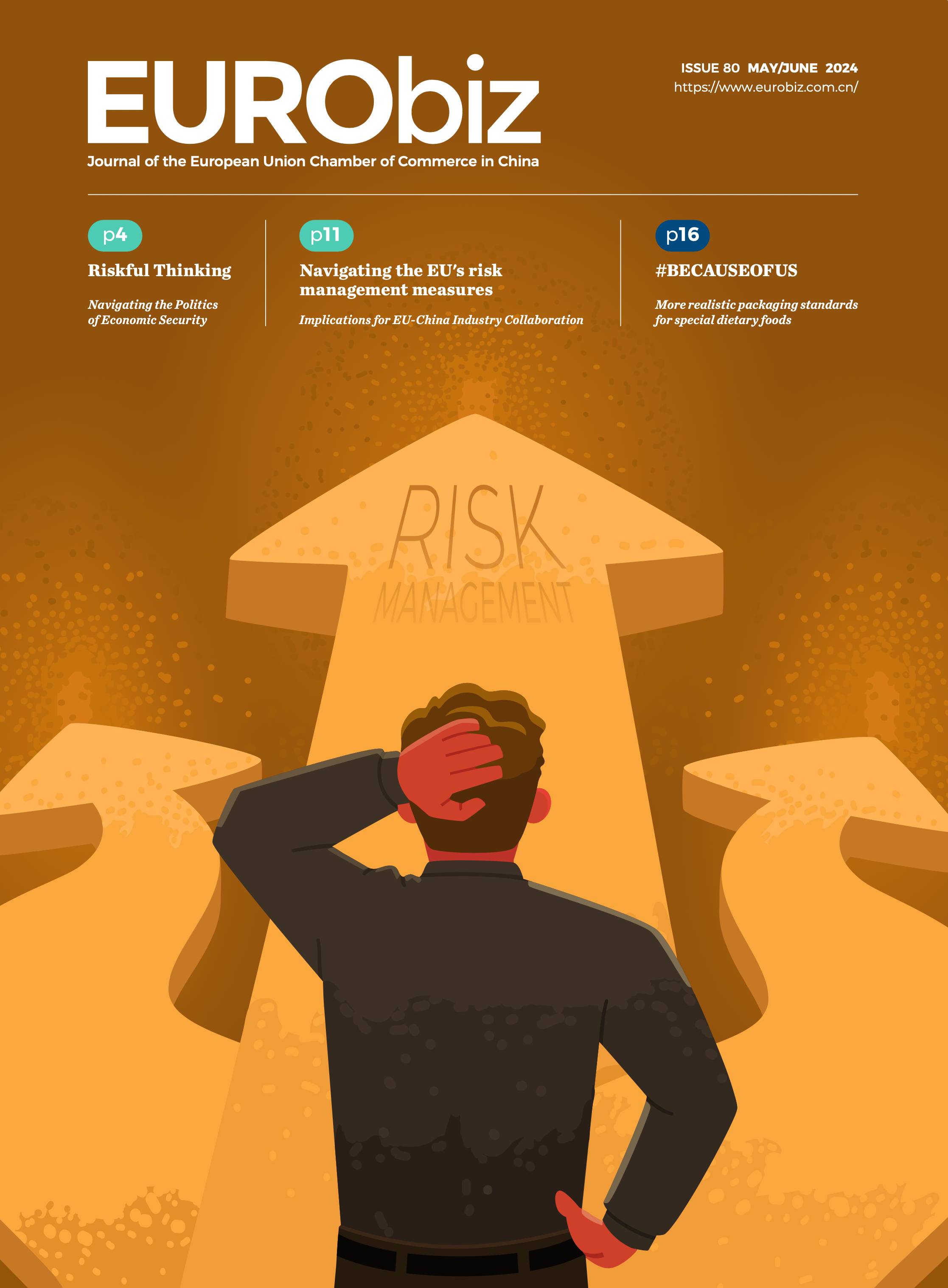
How can European companies benefit from it?
The European Union (EU) and China share common interests and goals for the clean energy transition, and are jointly responsible for one third of the world’s final energy consumption. Since 1994, EU and Chinese officials have met annually for an energy dialogue to cooperate on energy issues at ministerial level. The dialogue broadly focusses on four areas: energy systems, energy efficiency, renewable energy and innovative entities.[1] Susana Xu, coordinator of the European Chamber’s Energy Working Group in Beijing, looks at two of the major cooperation platforms set up between the EU and China for this purpose, and outlines how the Chamber has been involved in facilitating these dialogues and advocating on issues of concern for Chamber member companies.
EU-China Energy Cooperation Platform (ECECP)
The ECECP is a practical tool launched in May 2019 to support the implementation of activities announced in the Joint Statement on the Implementation of EU-China Energy Cooperation, signed during the 8th EU-China Energy Dialogue in Brussels.[2] The overall objective of the ECECP is to enhance EU-China cooperation on energy and pass on experience in energy policy and market designing, while bringing close industry players from both sides. Jointly steered by the European Commission’s Directorate-General for Energy (DG ENER) and the Chinese National Energy Administration (NEA), funded by the EU Foreign Policy Instrument and implemented by a consortium led by the international consultancy firm ICF, the project is currently in its Phase II (October 2021–January 2024). Over the past years, the ECECP has issued important thematic reports, and created opportunities for political and policy exchange and visibility as well as new business prospects for innovative companies in the energy sector.
Since 2019, the Energy Working Group of the European Chamber has taken part in working-/high-level project steering meetings for the business component (Component B) of the ECECP. Discussions included the implementation of Component B, Chamber members’ involvement and participation, and annual work plans, among others.
The Energy Working Group has also actively engaged in multiple activities of the ECECP. At the ECECP’s official launch event in May 2019, more than 200 representatives from a wide range of fields—including government officials, researchers from non-governmental organisations and institutions, and Energy Working Group members, as well as scholars and the media—engaged in extensive discussions on topics including power market reform, natural gas market development, energy saving and energy efficiency, clean energy market financing and technology innovation. Similarly, Energy Working Group representatives participated in the ECECP’s offline workshop, ‘Promoting Innovation in Energy Technologies’,in January 2021,to explore ways to enhance cooperation between innovative solution providers from the EU and China, and to accelerate the commercialisation of these solutions. Members also engaged in various ECECP online workshops to present the experience of the European power sector, as well as in networking events such as the EU Energy Day to meet with energy players in Beijing and follow a livestream of the Climate Change Conference (COP26) in Glasgow later that year.
In May 2022, the Energy Working Group co-organised a two-day online conference with the ECECP and Energy Post, themed ‘China Carbon Neutral by 2060 – Innovation’, where expert analysts and EU business representatives unveiled the latest trends and targets, plus case studies. In November 2022, the Energy Working Group also supported the ECECP’s EU Energy Innovation Virtual Expo, an online exhibition that showcased 15 European companies that wished to introduce their innovative technologies in renewables, energy efficiency, energy storage, power grids and buildings to the Chinese market.
China-Europe Energy Innovation Cooperation (CEEI)
The CEEI network is another cooperation mechanism between China and the EU to deepen cooperation in the energy sector. It was launched in October 2020, aiming to promote the application and commercialisation of advanced energy technologies, while supporting China in its low-carbon energy transition.[3] Entrusted by the NEA, the China Electric Power Planning and Engineering Institute (EPPEI) implements CEEI-related work with the support of the European Chamber’s Energy Working Group. The CEEI network now covers more than 400 major Chinese and European energy companies in four specialised working groups (专项领域): smart energy, hydrogen, wind power and energy storage. It has carried out more than 70 exchange activities, more than 10 joint research and development (R&D) projects and dozens of practical cooperation projects.
The Energy Working Group cooperates closely with the EPPEI on CEEI-related activities. The working group co-organised with the EPPEI the launch ceremony of the CEEI in Beijing in October 2020, where more than 300 attendees joined onsite, including Lin Shanqing, (then) vice administrator of the NEA, (then) European Chamber President Jörg Wuttke, and representatives of the EU Delegation to China and EU embassies, local government agencies, Chinese and European energy and power enterprises, industry associations, research institutions, financial institutions, other chambers of commerce and technological innovation organisations. In 2021, organisations were selected as leaders of each specialised working group (牵头单位) and held their respective kick-off meetings.
Over the past three years, a series of workshops have taken place across China, aiming to foster technological and industrial exchanges: for example, the China-Europe Hydrogen Workshop in Suzhou on 29th June 2021; the China-EU Smart Energy and Green Development Forum in Chengdu on 17th September 2021; the China-Europe Offshore Wind Power Cooperation Forum in Yancheng on 16th November 2021; and, more recently, the China-Europe Energy Storage Track II Dialogue in Beijing on 10th May 2023.
In the meantime, joint R&D projects were conducted based on pragmatic cooperation, many of which received government funding. On 10th December 2022, eight best-practices and 20 outstanding individuals under the CEEI network were announced and awarded by the NEA. The establishment of a new specialised working group focussing on bioenergy is ongoing.
Conclusion
While China’s goals to peak carbon emissions before 2030 and reach carbon neutrality by 2060 are ambitious, deepening EU-China cooperation in the energy sector will allow China to utilise the technologies it needs to accelerate this process. The European Chamber and its Energy Working Group will continue to cooperate with important platforms such as the ECECP and the CEEI, continuously expand its network and raise its visibility in the Chinese market, and facilitate pragmatic cooperation between Chinese and European energy players.
The European Chamber’s Energy Working Group comprises over 200 companies across the energy supply chain, including equipment manufacturers, energy production and infrastructure firms, service providers, and consultants. The working group seeks to establish constructive dialogue on energy policies with relevant regulators, provide input on China’s energy policy work and share best practices from European energy industries operating in China.
[1] EU-China cooperation on energy issues, European Commission, <https://energy.ec.europa.eu/topics/international-cooperation/key-partner-countries-and-regions/china_en>
[2] About EU-China Energy Cooperation Platform (ECECP), ECECP, 25th November 2019, viewed 29th September 2023, <http://www.ececp.eu/en/about-eu-china-energy-cooperation-platform-ececp>
[3] China-Europe Energy Technology Innovation Cooperation Forum Held, China Energy News, 2nd November 2020, viewed 29th September 2023, <http://paper.people.com.cn/zgnyb/html/2020-11/02/content_2016487.htm>


Recent Comments